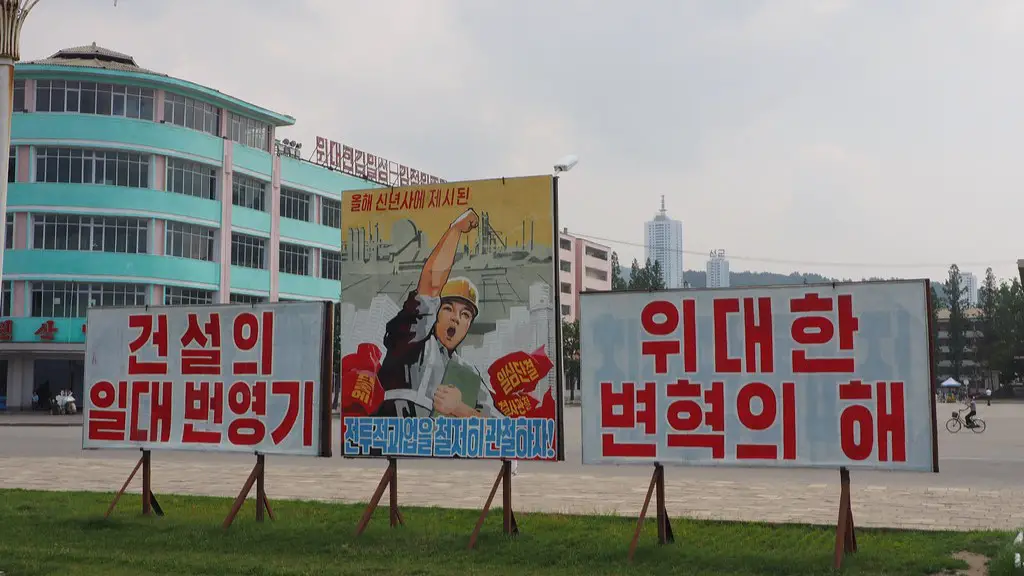How North Korea Got The Bomb
Since its formation in 1948, North Korea has been one of the world’s most isolated and reclusive countries. North Korea began its quest to develop a nuclear weapon in earnest in the early 1990s, under the leadership of Kim Il-Sung. By 1993, North Korea had withdrawn from the Nuclear Non-Proliferation Treaty and was soon thought to be developing nuclear weapons. North Korea conducted its first nuclear test on October 9 2006, which it referred to as a “successful nuclear explosion”.
North Korea’s ambition to develop a nuclear weapon was based on political, economic, and military motivations. Politically, North Korea was keen to obtain status and credibility among nations recognized as having nuclear weapons, and thus gain leverage in negotiations with world powers such as the United States. Economically, North Korea’s weak economy relies heavily on international aid, and it viewed nuclear development as a way to ensure its economic security. Militarily, North Korea sees nuclear weapons as a way to protect its borders from attack, and as a way to deter its enemies from launching military action against it.
In order to build a nuclear weapon, North Korea first needed to acquire the materials and technology necessary to make it happen. North Korea was able to acquire the necessary technology, such as nuclear fuel and centrifuges, through Pakistan, Russia, and China, as well as other countries. North Korea was also able to acquire the materials necessary for the construction of a nuclear bomb, such as uranium and plutonium, from the available resources in its own country. It is thought that North Korea used a network of international arms dealers and smuggling operations to acquire these materials and technology.
North Korea has been able to achieve this feat despite international sanctions and condemnation through a combination of its own technical expertise, international assistance, and illegal trade. North Korea’s ability to successfully launch a nuclear weapon has been a major cause of concern not only in the region, but also around the world. North Korea has been repeatedly warned by the international community against testing and launching nuclear weapons, but the isolated nation has so far refused to comply.
Despite the sanctions, North Korea continues to test and launch nuclear weapons on a regular basis, and its stockpile of nuclear weapons is estimated to be at least 10. The ramifications of nuclear war would be disastrous for the region and for the world at large. In order to prevent a nuclear conflict, world leaders and international organizations are urging North Korea to denuclearize, but so far these efforts have been in vain.
How North Korea Gains International Assistance
Despite being heavily isolated, North Korea is able to obtain international assistance for its nuclear program. Countries such as Russia, Pakistan, and China, along with many smaller countries, have provided the isolated nation with both technical expertise and material resources. In exchange for its assistance, North Korea gains legitimacy and international recognition, as well as economic and military benefits.
This arrangement has been beneficial to both North Korea and its partners. North Korea has been able to gain the necessary materials, technology, and expertise to develop a nuclear weapon, while its partners have been able to gain military and economic benefits. This has allowed North Korea to become a major player in the global nuclear proliferation game, despite its isolation.
In recent years, however, tensions between the United States and North Korea have risen significantly, and the international community is now pressuring North Korea to denuclearize. The United States, in particular, has imposed heavy economic and diplomatic sanctions on North Korea in an effort to persuade the nation to abandon its nuclear ambitions. Despite these efforts, North Korea continues to test and launch nuclear weapons on a regular basis.
Impact of North Korea’s Nuclear Weapons
North Korea’s possession of nuclear weapons has had a significant impact on the international community. The nation’s actions have been met with widespread condemnation and international sanctions, yet North Korea continues to pursue its nuclear ambitions. The country’s possession of nuclear weapons has also caused concern among its neighboring countries, who fear that North Korea may be unstable and unpredictable.
International organizations such as the United Nations and the International Atomic Energy Agency have been urging North Korea to abandon its nuclear weapons program, but so far their efforts have been in vain. As a result, tensions between North Korea and the United States and its allies continue to mount and a diplomatic solution has yet to be reached.
Moreover, North Korean leader Kim Jong-un has repeatedly threatened to use nuclear weapons against the United States, its allies, and other countries, leading to increased international pressure. North Korea’s possession of nuclear weapons has also created an opportunity for other nations to possess such weapons, leading to an arms race in the region.
Nuclear Weapons and International Law
North Korea’s possession of nuclear weapons is also a concern due to its violation of international law. North Korea is a signatory of numerous treaties and conventions that prohibit the development and use of nuclear weapons. Nevertheless, the country has chosen to ignore these agreements, and continues to develop and test nuclear weapons.
The United Nations Security Council does not recognize the legitimacy of North Korea’s nuclear weapons program, and has imposed a number of sanctions on the country in an effort to compel it to abandon such activities. Nevertheless, these measures have had little effect, and North Korea continues to defy international law.
Additionally, the United States and its allies have also imposed unilateral sanctions on North Korea, which have made it increasingly difficult for the isolated nation to export goods. As a result, North Korea’s economy is facing severe strain and its citizens are facing hardships.
Potential Solutions
In order to prevent a nuclear conflict in the region, the international community has been urging North Korea to denuclearize. In order to achieve this goal, world leaders and international organizations have proposed several possible solutions. One such solution is to pursue diplomatic dialogue and negotiations with North Korea, in order to persuade the nation to abandon its nuclear ambitions. The United States and its allies have also imposed economic sanctions on North Korea, in an effort to pressure the country to denuclearize.
In addition, there have also been calls for a region-wide nuclear-free zone, which would include the complete denuclearization of North Korea. This would involve the complete dismantling of North Korea’s nuclear weapons program and its weapons facilities. This solution would require a high level of international cooperation and would likely take a long time to achieve.
Finally, there has also been discussion of a denuclearization process led by the United Nations and international organizations. This would involve the inspection and monitoring of North Korea’s nuclear activities in order to ensure that the country does not deviate from the agreement. However, it is unclear whether North Korea would accept such a proposal.
Continuing International Pressure
Despite the efforts of the international community to persuade North Korea to abandon its nuclear ambitions, the isolated nation continues to test and launch nuclear weapons on a regular basis. Moreover, North Korea has repeatedly threatened to use nuclear weapons against the United States and its allies, leading to further international condemnation and pressure. In order to prevent a nuclear conflict in the region, the international community must continue to inspect and monitor North Korea’s nuclear activities.
In addition, the United States and its allies must continue to impose economic and diplomatic sanctions on North Korea in an effort to persuade the country to abandon its nuclear ambitions. Furthermore, world leaders and international organizations must continue to pursue diplomatic dialogue and negotiations with North Korea in order to achieve a diplomatic solution.
Finally, the international community must continue to work towards the establishment of a region-wide nuclear-free zone, which would ensure the complete denuclearization of North Korea. However, it is unclear whether North Korea would accept such a proposal, or whether other countries in the region would be willing to participate in such a process.





